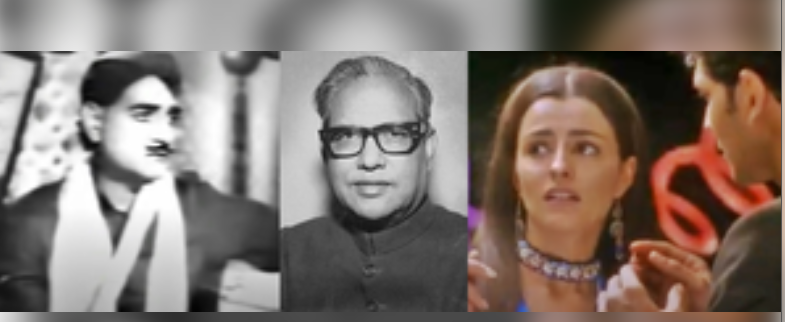Filmworld
'Zamane ko dikhana hai..': Majrooh Sultanpuri's lengthy and paradoxical career in Hindi films

New Delhi, Oct 1
His lyrical exploits in Hindi films spanned over half a century, starting from K.L. Saigal to the Khan trio, but were versatile, prodigious, and paradoxical - the pathos-filled "Jab dil hi toot gaya" was penned when he was in his 20s while frothy numbers like "Papa kehte hai", "Pehla nasha, Pehla khumar", and "Janam samjha karo" that entranced teenagers when he was in his 70s.
Majrooh Sultanpuri wrote nearly 4,000 songs for around 350 Hindi films and was also a familiar name for radio listeners.
At one end are sublime creations like ghazals "Shaam-e-gam ki qasam, aaj gamgin hain ham" ("Footpath") and "Rahte the kabhi jinke dil mein" ("Mamta"), the evergreen "Rahen na rahen ham" ("Mamta") or "Hai apna dil to awara" ("Solva Saal"), the softly sensual "Baahon mein chale aao" ("Anamika") or "Raat akeli hai bujh gaye diye" ("Jewel Thief"), the pensive "Rahii manva dukh ki chinta kyun satati hai" ("Dosti"), dapper Dev Anand's "Khwab ho tum yaa koi haqeeqat" ("Teen Deviyan"), the heartfelt "Tumne mujhe dekha ho kar mehrbaan" ("Teesri Manzil") and the haunting "Hamen tumse pyar kitna" ("Kudrat"), among others.
There were crowd-pleasers like "O haseena zulfon wali jaan-e-jahan" and "Aa jaa aa jaa main hoon pyaar tera" ("Teesri Manzil), "Chhorh do aanchal zamaana kya kahega" ("Paying Guest), "Chura liya hai tumne jo dil ko" ("Yaadon Ki Baraat"), "Aaj main oopar, aasmaan neeche" ("Khamoshi"), "Piya tuu ab to aa jaa" ("Caravan"), "Laal laal gaal" ("Mr X"), 'modern' qawwalis like "Haal kya hai dilon ka na puchho sanam" ("Anokhi Ada"), and "Hai agar dushman zamana" ("Ham Kisi Se Kam Nahi"), and the 'kotha' song "Inhi logon ne le lina dupatta mera” (Pakeezah"), which is risque without being vulgar and made good use of the earthy but expressive idiom of his native Awadhi.
And then, there are the (superficially) trite-seeming like "C A T cat, cat maane billi" ("Dilli ka Thug"), "Babu samjho ishaare hauran pukaare pam pam pam" ("Chalti Ka Naam Gaadi"), "Saala main to saahab ban gaya" ("Sagina"), the raunchy remix favourite “Bangle ke peeche teri beri ke neeche” - better known from its interjection “Kaanta laga" ("Samadhi"), "Pallo latke re mharo pallo latke" ("Naukar"), "Daddy se puchh lena" ("Guddu") and the like.
But this paradox permeated the personal, professional, and political life of Asrar-ul Hasan Khan ‘Majrooh Sultanpuri’, who was born this day (October 1) in 1919. His education was traditional, but it is unclear whether this was due to his policeman father's distrust of modern studies or their financial condition. This was the first paradox - while well-versed in Arabic and Persian, he made free use of English words in the songs he wrote for Bollywood, more than any of his peers.
The second paradox was that despite his traditional education, he became a committed communist and a member of the Progressive Writers’ Association.
Then, thirdly, he trained as an Unani hakim in Lucknow and began to practice there - but for his poetic takhallus, chose a word which means "wounded". Simultaneously, he began his poetic stint, participating in local “mushairas”, where he made a mark for himself, and more importantly came to the attention of Ali Sikandar ‘Jigar Moradabadi’, who made him a protege.
And then, while he would go to jail for his communist beliefs in independent India, along with Balraj Sahni, for refusing to write an apology that would let him off, he, along with fellow committed revolutionary Faiz Ahmed 'Faiz', disobeyed the orders of their Communist bosses to abandon the ghazal, which "was a feudal remnant and unsuited to articulating class consciousness". The duo also managed to convince the leadership that this form could feature a new idiom and imagery without losing its lyrical nature.
His film career was not pre-ordained. He was participating in a mushaira in Bombay in 1945 when impressed producer A.R. Kardar approached him to write film lyrics but was rebuffed. However, the determined Kardar would not let go and sought the intervention of Jigar, who convinced his protege that this career would help support his family.
Majrooh then impressed Naushad, a poet himself and a fairly well-established music composer by then, to get his break with Saigal’s "Shahjahan" (1946). This launched a career that only ended with his passing away in 2000, with Majrooh outliving and outperforming his peers like Sahir Ludhianvi, Shakeel Badayuni, and Shailendra.
He also became the first lyricist to be conferred the Dadasaheb Phalke Award in 1993 - it was only in 2013 that Gulzar became the second. On the other hand, he received just a sole Filmfare Award (for “Chahunga main tujhe” from "Dosti").





























